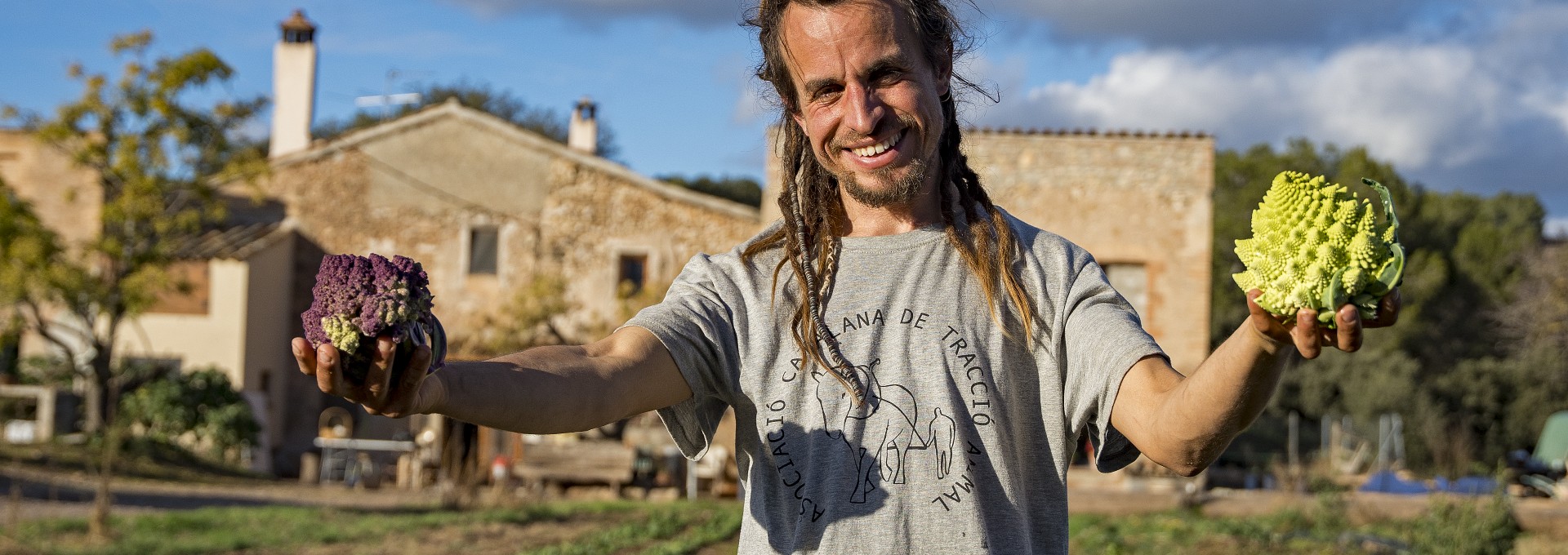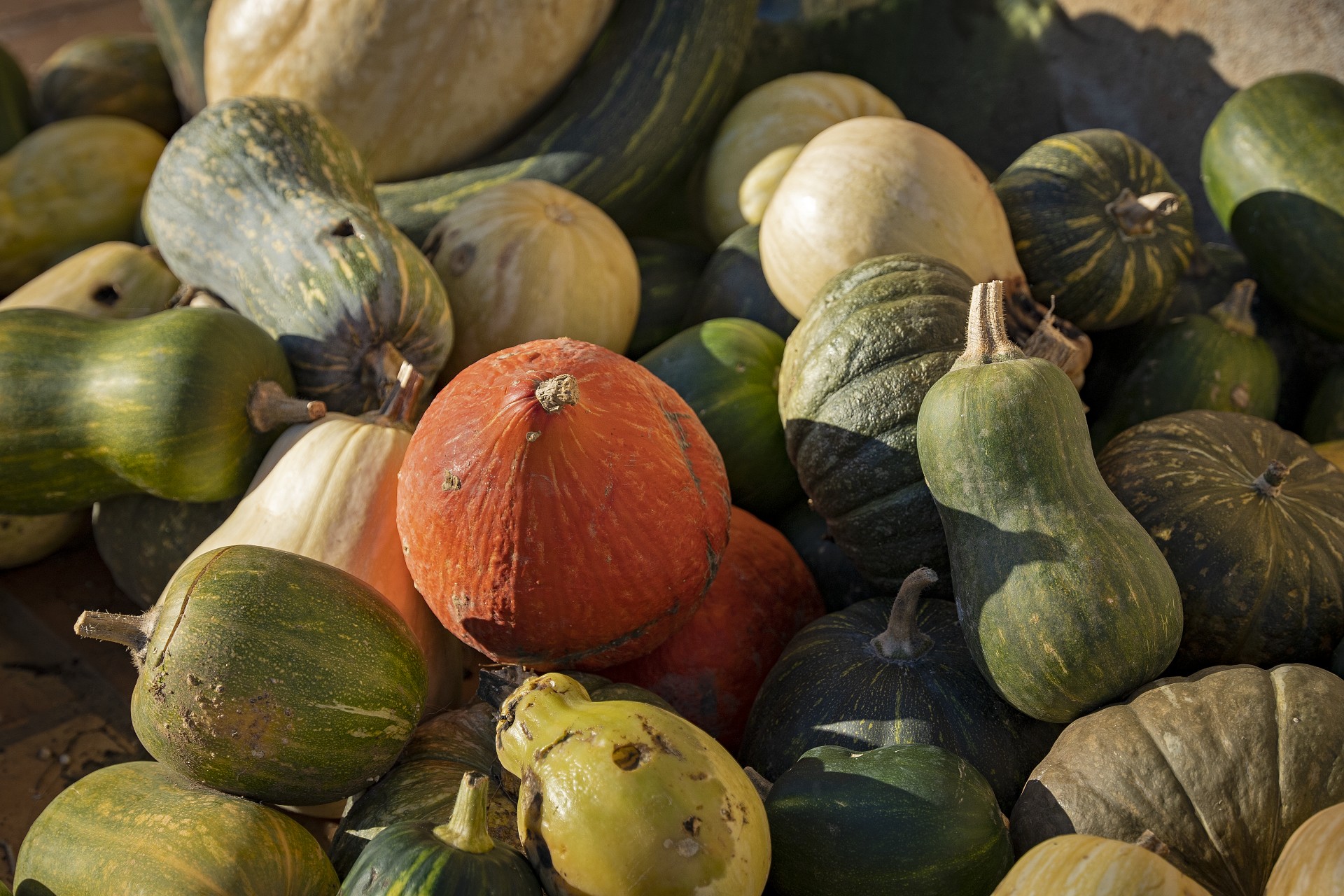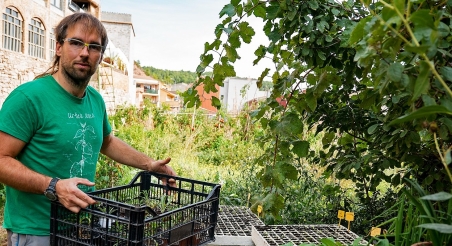As a child, Adrià Solé (Barcelona, 1988) would read with astonishment about the topics featured in Greenpeace Magazine, which his father regularly received. It was all about ecological disasters. «Finding out about the progressive deforestation taking place in the Amazon, Indonesia, Borneo and Sumatra had a huge impact on me,» he recalls. So much so that, some years later, he opted to pursue a degree in biology with a view to working for the conservation of ecosystems.
Beyond an interest in environmentalism, there was no talk of farming at Adrià’s house. Although his father eventually inherited Can Mercaderet – the family farm located in the municipality of Santa Margarida de Montbui –, Adrià grew up in an apartment block in the city of Igualada. His grandparents had cultivated vines on the farm, but, like many others at that time, they gave up farming for factory work. The vines were torn up after they leased the estate to tenant farmers.
The tenant farmers’ daughter, now 92 years old, still lives at Can Mercaderet, alongside Adrià, his partner, his sister and several friends. As well as being their home, the farm is the headquarters of Ecomercaderet, a work cooperative devoted to organic horticulture. In total, they farm 12 hectares of food and fodder crops, including a one-hectare olive grove and a one-hectare market garden. Seven hectares belong to the farm and the other five are leased. In addition, the cooperative manages nine hectares of forest and forest pastures, three hectares of which have been made available to it thanks to the support of the Land Banks Network promoted by Barcelona Provincial Council.
When you arrive at the farmhouse in Santa Margarida de Montbui, you soon understand the meaning of the term «cultivated biodiversity». Pumpkins of myriad shapes and colours stretch along the ground, basking in the sun in the shelter of a farmhouse with its doors flung open. Inside, in the production room, Adrià is busy preparing the yoghurts and mató (Catalan fresh cheese) that he’ll take to a local school on Tuesday. The farm exudes healthiness: a house full of life surrounded by land cultivated with love and dedication. If we were to imagine a utopian future in a rural setting, the image that would come to mind would be very similar to Adrià’s setup. This regenerative mixed farm, with a market garden, pasture land, animals and people, is like a dream you don’t want to wake up from.
«As it is currently conceived, the agrifood system is more of a problem than a solution,» says Adrià. He’s always thought it logical to adopt a regenerative model, although he acknowledges that it’s difficult to sustain. Ecomercaderet began as an idea that later materialised in a seed bank and the creation of the Agroecological Association of Can Mercaderet (AACM), an entity that aims to promote organic, local and small-scale farming: a fair and healthy model that’s beneficial to consumers, farmers and the environment. The association believes it’s necessary to combine traditional know-how – passed down through generations of farmers – with current scientific knowledge in areas such as plant ecology, soil science, plant physiology and varietal and technological improvements, in order to adapt new farming to the society of the 21st century.
«The current agri-food system, as it is conceived, is more of a problem than a solution» Adrià Solé
The entity emerged as a result of the friendship between Adrià, the promoter of Ecomercaderet, and Marc Talavera, president of the Eixarcolant Collective. The two met at university and were both members of a mountaineering club. One day they decided to collaborate, concerned about the problems arising from intensive, polluting farming practices, the decline in agricultural diversity and the loss of a significant amount of knowledge of farming culture. Together they created the Can Mercaderet seed bank and carried out various ethnobotanical surveys on the estate. Adrià used this data in the final project of his master’s degree in organic farming at the University of Barcelona, while Marc incorporated it in his doctoral thesis on edible wild plants. Meanwhile, Adrià embarked on the horticultural project with the aim of selling the food grown on the farm.
The traditional farmhouse is a diverse one
Adrià explains that the Can Mercaderet Agroecological Association started growing vegetables because, with a small surface area, it could be «somewhat profitable». He began life as a farmer by organically cultivating a one-hectare vegetable garden. At the same time, he planted old grains such as emmer wheat in the surrounding fields. However, the land had become extremely impoverished. «Barley had been grown with pesticides, then the land had been left fallow and ploughed, so it didn’t have much organic matter,» he recalls. He pondered how to regenerate land exploited by intensive farming. Improving it with manure spreader trucks would be a very expensive option. He knew this because he’d already bought organically certified manure to spread on the vegetable garden. Suddenly, he had an idea: if he was going to establish a sustainable agricultural system on the farm, he needed to incorporate cattle; specifically, herbivorous animals.
With enthusiasm and curiosity, the association’s members researched the most innovative livestock projects and decided to breed cows, since this option involved less work than looking after other animals and was viable for their project. One of the examples they studied was an initiative in the Basque Country where four workers take care of 18 cows and produce seven types of dairy products that they sell directly to consumers. They also studied cases in Menorca, such as a traditional dairy farm with native cows that supports several people through the sale of the ice cream it produces. In the village of Les Llosses, in the Girona area, they discovered Mas El Lladré, a small family livestock project that’s been running successfully since 1992, producing its own dairy products. Adrià explains that, despite the current trend towards larger operations, they sought inspiration from small-scale farms. «And we found them,» he adds. Two years have passed since the first calves arrived at Ecomercaderet and the farm’s already producing dairy products in its production facility for a local school, having obtained the necessary permits for this activity last spring.
The addition of cows has significantly improved the fertility of the land. Currently, they practice regenerative grazing practices on the farm, which means having less and less bought-in manure. Now they store the manure generated by the animals during the year and spread it in winter. As a result, the soil, which is the lifeblood of a farming project, is covered for a greater part of the year. What’s more, they haven’t ploughed the land for two years. When we ask if they’ve noticed the effects of the new approach, they quickly mention a key word: resilience. You can achieve much greater resilience by sowing pastures with alfalfa or sainfoin than by planting wheat, since they have perennial roots and can survive even if it doesn’t rain as much as expected. However, there’s always room for improvement, and Adrià and his colleagues are keen to increase pasture diversification. We can hear the cows mooing as he shows us around the greenhouse.
You can see how much this young farmer enjoys his work. As he sees it, his approach to farming makes perfect sense. «What motivates me is to create a cooperative where workers and members feel comfortable and work decent hours in a project that produces a large quantity and wide variety of food, while closing as many circles as possible. That satisfies me, but it’s also hard work,» he says. Adrià aims to ensure that the team can have holiday time and take it in turns to work weekends.
Looking beyond Ecomercaderet, he believes that we should aspire to be a society that promotes the reduction of consumption, that’s committed to degrowth and that safeguards basic services, such as access to food. He’s driven by a challenge: to prove that it’s possible to achieve sustainable, local food.
«I am motivated to create a cooperative where the workers and members are at ease» Adrià Solé
Local consumers: the key factor
The positive response of consumers is essential to achieving the profitability of an agricultural project. At Ecomercaderet, they were inspired by the AMAP (Association pour le Maintien d’une Agriculture Paysanne – Association for the Preservation of Small-Scale Family Farming) and community-supported agriculture. In both systems, consumers play an active supporting role for farmers, which goes beyond monetary exchange for the vegetables they purchase. In Catalonia, they also explored initiatives involving baskets of vegetables selected by the farm and paid for in advance by customers. Having studied all of these examples, Adrià opted for direct sales through vegetable baskets. They currently supply around 20 baskets per week, although the amount can vary from 10 to 50, depending on demand.
The sale of vegetable baskets was the initial strategy of the business but now accounts for just one-fifth of its revenue. At Ecomercaderet, they consider that making the shift from theory to practice has been no easy task. «We have a hard time getting people to cement their commitment,» says Adrià. Although they have a loyal group of customers who value their work and visit their stall at the Masuca market in Igualada, on Wednesdays and Fridays, there’s an obstacle that hinders their efforts: people don’t show consistency in their purchases. «You try to plan the market garden for the whole year, growing a wide variety of produce, including local varieties, but then you often get customers who want the produce you don’t have much of rather than what you’ve got a lot of,» he says with resignation. However, they’re not about to give up. In fact, they do plenty of educational work with the customers of the future, regularly hosting visits from schools organised by committed teachers.
As for the surrounding network, Ecomercaderet is located within the Òdena Basin Agricultural Park. Being part of this project has opened up opportunities for producers to receive subsidies, as well as sales opportunities, whether at local food fairs or by participating in Christmas hamper initiatives. As part of its collaboration with the agricultural park, the Ecomercaderet team attends several annual meetings, giving it the chance to forge links with other local producer associations.
Public meals and organic food
Adrià is quite sceptical about the role of public bodies: «They don’t really believe in changing the system.» He suggests that the thousands of public meals funded every day by the Government of Catalonia could be made with organic or local food. This is one of the policies he believes could make a real difference for small farmers. He considers that establishing an agricultural income is another measure worth implementing.
His main complaint about surviving as a small farmer is that today you’re expected to be a jack of all trades: farmer, sales representative, salesperson, clerk, IT professional... while at the same time trying to educate people about the importance of eating seasonal foods.
Regarding the new agricultural Land Registry of Catalonia to be launched by the Government of Catalonia, Adrià does not consider it a particularly effective solution. The goal of establishing the registry is to reduce the abandonment of agricultural land by listing it in an inventory and allowing its temporary expropriation for new farmers to settle there. Adrià thinks the measure contains a potential danger, which is that large companies in the food industry and major landowners could continue with the concentration of land.
Moreover, in his view, some landowners are concerned that the public authorities may classify certain land management practices as abandonment. «If they really want to guarantee the use of land for crop farming, the first thing they should do is protect it from speculative energy projects. Otherwise, they’re not being honest or consistent.»
Ecomercaderet is an agroecological project with a critical eye. In addition to working with great dedication, its promoters are striving to achieve a profound transformation of the food system, which they do hand in hand with the social and solidarity economy. When asked about generational renewal, Adrià finds it perfectly normal that few people want to embark on farming projects. «It’s a fascinating political struggle, but it depends on institutions believing in it, people believing in it and making a cultural shift. It involves lots of changes. It’s complicated but necessary. Otherwise, what’s the alternative?»
We leave Santa Margarida de Montbui wishing a long life to a project with such a clear vision, to a project that continues to fight for a more sustainable primary sector, with land, food and community as the three key pillars of its future.
— BCN Smart Rural Editorial —




